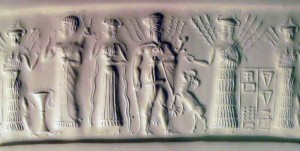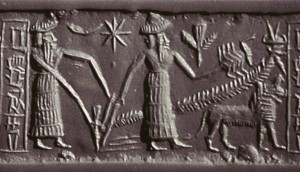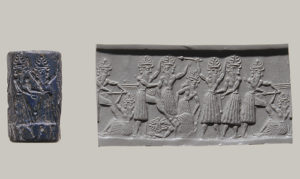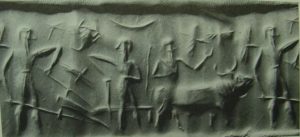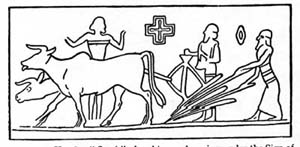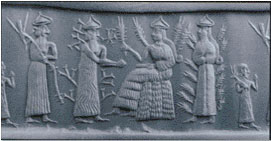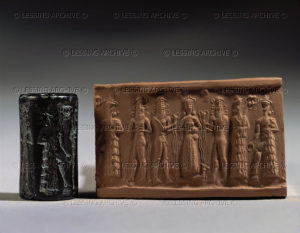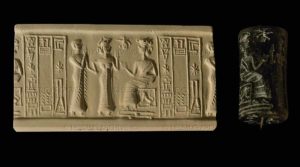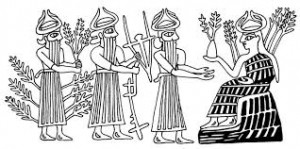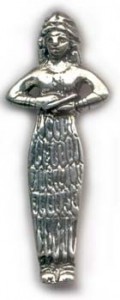The Electronic Text Corpus of Sumerian Literature
(Texts: All Artifacts, Color Coding, & Writings in Bold Type With Italics Inside Parenthesis, are Added by Editor R. Brown, not the Authors, Translators, or Publishers!)
(gods in blue …mixed-breed demigods in teal…)
After the Flood had swept over and caused the destruction of the earth,
when the permanence of humanity had been assured and its descendants preserved,
when the black-headed people had risen up again from their clay,
and when, humanity’s name having been given and government having been established,
[the gods] An (Anu) and Enlil had not yet caused kingship, crown of the cities, to come down from heaven,
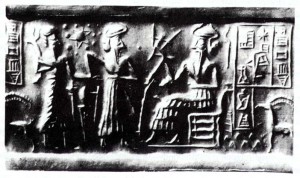 (earthling, Ninurta & Enlil giving 1st plow & the labor to mankind)
(earthling, Ninurta & Enlil giving 1st plow & the labor to mankind)
and by Ningirsu (Ninurta), they had not yet put in place the spade,
the hoe, the basket, nor the plow that turns the soil, for the countless throng of silent people –
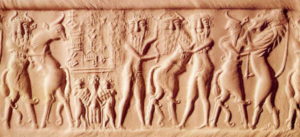 (earthlings prior to DNA modifications, non-workers)
(earthlings prior to DNA modifications, non-workers)
at that time the human race in its carefree infancy had a hundred years.
Coming into an advanced age, it had another hundred years.
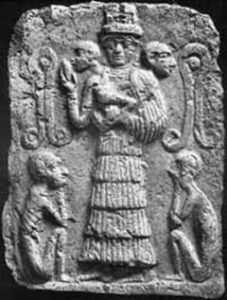 (Ninhursag with her failed early attempts to fashion workers, using manipulated DNA mixes)
(Ninhursag with her failed early attempts to fashion workers, using manipulated DNA mixes)
But without the ability to carry out the required work, its numbers decreased, decreased greatly.
In the sheepfolds, its sheep and goats died out.
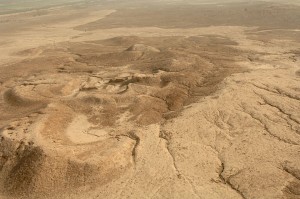 (areal view of Lagash ruins)
(areal view of Lagash ruins)
At this time, water was short in Lagaš (Lagash), there was famine in Girsu.
Canals were not dug, vast lands were not irrigated by a shadoof,
abundant water was not used to dampen meadows and fields, because humanity counted on rainwater.
(Inanna, unidentified mixed-breed, Ninlil, her father Haia, & his spouse Nisaba, Ninlil‘s mother, the Goddess of Grains)
Ašnan (Nisaba) did not bring forth dappled barley, no furrow was plowed nor bore fruit!
No land was worked nor bore fruit!
No country or people made libations of beer or wine, […] sweet wine […], to the gods.
No one used the plow to work the vast lands.
(…)
The canals […].
Their fields […].
In order to dig the canals, in order to dredge the irrigation ditches, in order to irrigate the vast lands by a shadoof,
in order to utilize abundant water so that the meadows and fields were moistened,
(Anunnaki gods hard working the soil alien giant gods demand replacement workers from Enlil)
An and Enlil put a spade, a hoe, a basket, a plow, the life of the land, at the disposal of the people.
(earthlings taught to farm by the gods, who tired from the long heavy labor needed performed on Earth Colony)
After this time, human beings gave all their attention to making the barley grow.
Before the Young Lady, in front of her they stood upright, ready to work.
Day and night, whenever necessary, they were attentive.
They bowed down before Ašnan (Nisaba) who produces barley seed and began to work.
(Enlil, father-in-law Haia, mother-in-law Nisaba, spouse Ninlil, unidentified smaller mixed-breed with dinner)
Before Ašnan (Nisaba) who produces the late barley, they […].
(…) […] reigned […].
(Biblical – Genesis 6: “When men began to increase in number on the earth and daughters were born to them, the sons of God saw that the daughters of men were beautiful, and they married any of them they chose… The Nephilim were on the earth in those days–and also afterward–when the sons of God went to the daughters of men and had children by them. They were the heroes of old, men of renown.”………)
(the 1st giant semi-divine mixed-breeds appointed to kingships over earthlings by the alien gods on Earth, they were bigger, stronger, faster, smarter, & lived much longer than earthlings, the perfect go-between from alien gods to the the earthlings…….SEE THE MANY EXAMPLES WITHIN TEXT)
Igi-huš[…] dug the canal [“…”]; he reigned 2,760 years.
En-a-kigala-guba, whose god was […], dug the canal “He bend an ear to Sirara” (Nanshe); he reigned 1,200 years.
(3 naked early advanced semi-divine mixed-breeds appointed to kingships, & 3 alien giant gods- Inanna, Nannar, & Utu)
At that time there was still no writing […], no canals were dug, no baskets were carried.
At that time, in the manner of a royal […], humanity presented offerings of polished gold, red, […] (to the gods, from the beginning!).
The faithful shepherd brought forth […] to the […] people, the steward offered him fish.
En-Ningirsu-ki’ag, son of En-a-kigala-guba, reigned 1,230 years (as did the 1st 10 generations of the Bible).
Ur-Baba, son of En-Ningirsu-ki’ag, reigned 900 years.
Agal, whose god was Igalim (Ninurta‘s son), reigned 660 years.
KUe, son of Agal, reigned 1,200 years.
Ama-alim, son of KUe, reigned 600 years.
Dan[…] reigned […] years.
[…] reigned […] years.
A[…] reigned […] years.
‘A[…], son of […], reigned […] years.
[…] dug canal [“…”]; he reigned […] years.
[…], son of […], dug the Eminent canal, the [“…”] canal, the “Canal that moves like a lion”,
the [“…”] canal, the “Lion Canal” at the mouth of the Royal Canal, the canal “Field, heaven‘s delight”,
the [“…”] canal, and the canal “Choice of Nanše (Nanshe, Enki‘s daughter)“.
To take care, alone, of the vast watered areas, he dug irrigation ditches […].
He reigned 2,220 years.
(Ur-Nanshe, giant mixed-breed king of Lagash, his spouse the Goddess of Love Inanna, & her mother Ningal)
Ur-Nanše, son of […]ma, who built E-sirara (Nanshe’s temple residence), the residence that was his heart’s joy,
and Sirara (temple complex in Lagash, name also used for Nanshe), his beloved city, reigned 1,080 years.
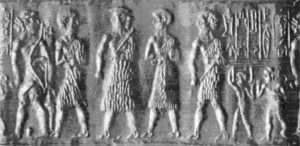 (King Eannetum in middle, Biblical “heroes of old, men of renown”)
(King Eannetum in middle, Biblical “heroes of old, men of renown”)
Ane-tum, son of Ur-Nanše, on the […] on which the gods stood upright, the […] of Enlil […],
whose god was Šulutula (unidentified?), reigned 690 years.
[…]gibil, son of Ane-tum, reigned N+360 years.
En-entar-zi, whose god was Mes-an-DU (unidentified?,), seed of days of old who grew up with the city, reigned 990 years.
[…]enda-insi, son of En-entar-zi, dug the “Ferocious lion” canal and canal
“[…] is canal inspector”; his god was Mes-an-Du (Adad, the Canal Inspector of the gods, back when the gods did the work).

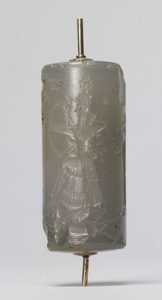 (warrior hero Ninurta / Ningirsu riding his winged beast, sky-craft in battle)
(warrior hero Ninurta / Ningirsu riding his winged beast, sky-craft in battle)
His king Ningirsu enjoined him to build his temple; he reigned 960 years.
En-Enlile-su reigned 600 years.
En[…], the son of En-Enlile-su, whose god was Ninasu (Ninazu, sometimes Enlil‘s son, sometimes Ereshkigal‘s son, or both),
reigned 660 years.
[…]du reigned 1,110 years.
Puzur-Ninlil reigned Nx60+1 years.
En-Mes-an-DU, son of Puzur-Ninlil, whose god was […], reigned 120 years.
Dadu, son of En-Mes-an-DU, reigned 160 years.
TUG-GUR, the son of Dadu, reigned 160 years.
La[…] reigned 120 years.
Puzur-Mama, Ninki‘s scribe (Enki‘s official spouse), whose goddess was Zazaru (unidentified?), reigned […] years.
LAM-KU-nigina, Puzur-Mama’s administrator, the one who constructed the wall of Girsu, his residence,
and the Tiraš palace in Lagaš, reigned 280 years.
Hengal, son of LAM-KU-nigina, whose god was […]-bilsag (Pabilsag / Ninurta), reigned 140 years.
[…], son of Hengal, reigned 144 years.
(Haia Ningirsu / Ninurta Enlil Haia‘s spouse Nisaba)
Ur-Nin-MAR.KI, scribe and expert […] (named after Enki’s daughter Ninmarki) whose gods were Haya and Nisaba, reigned N+20 years.
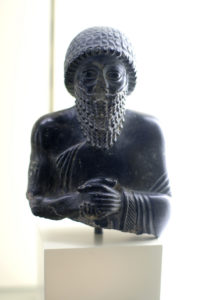 (Adad‘s semi-divine mixed-breed son-king Ur-Ningirsu, named after older brother Ningirsu / Ninurta)
(Adad‘s semi-divine mixed-breed son-king Ur-Ningirsu, named after older brother Ningirsu / Ninurta)
Ur-Ningirsu, son of Ur-Nin-MAR.KI, reigned Nx60 years.
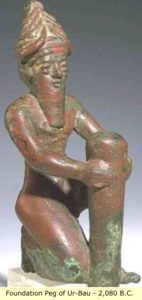 (4,000 year old foundation peg of Ur-Bau / Ur-Baba, figure of Ningishzidda, Architect of the ziggurats & pyramids)
(4,000 year old foundation peg of Ur-Bau / Ur-Baba, figure of Ningishzidda, Architect of the ziggurats & pyramids)
Ur-Baba, scribe of Ur-Ningirsu, the one who […] in the assembly, reigned N+30 years.
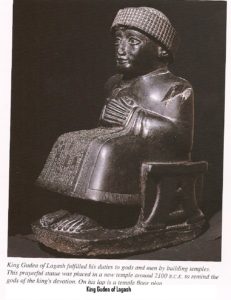 (giant mixed-breed king Gudea on his Lagash throne)
(giant mixed-breed king Gudea on his Lagash throne)
Gudea (Ninsun‘s & Lugalbanda’s 2/3rds divine son-king), younger brother of Ur-Baba, […]
who was not the son of either his mother or father (Anunnaki goddess offspring), reigned […] years.
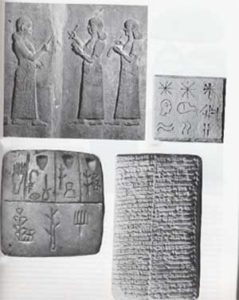 (Nisaba, Enlil‘s mother-in-law, Haia‘s spouse, Goddess of Scribes, Accounting, & Grains)
(Nisaba, Enlil‘s mother-in-law, Haia‘s spouse, Goddess of Scribes, Accounting, & Grains)
Written in the Academy.
Praise to Nisaba. (Master Scribe / Author of many Anunnaki alien recordings of original history on inhabited Earth)
